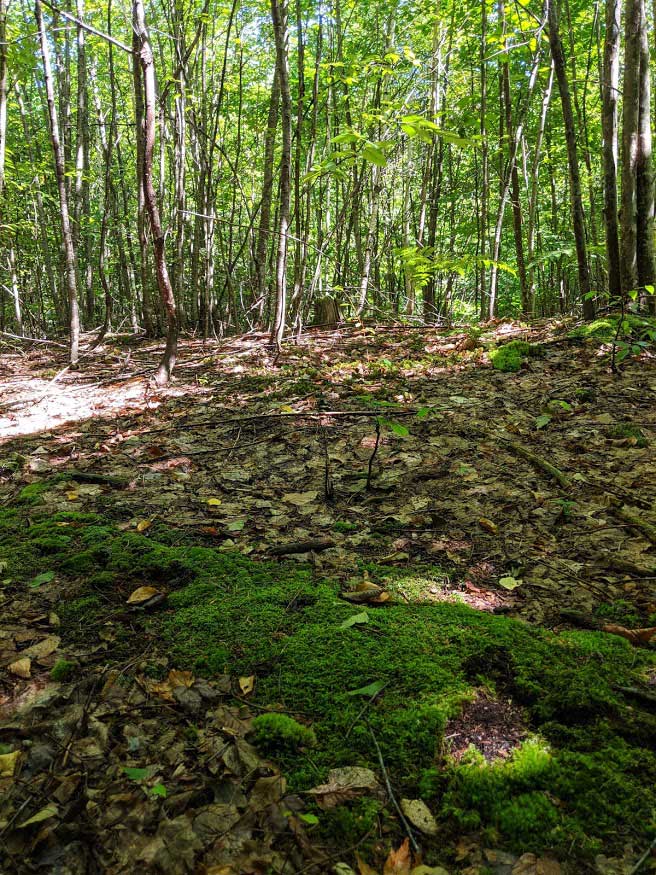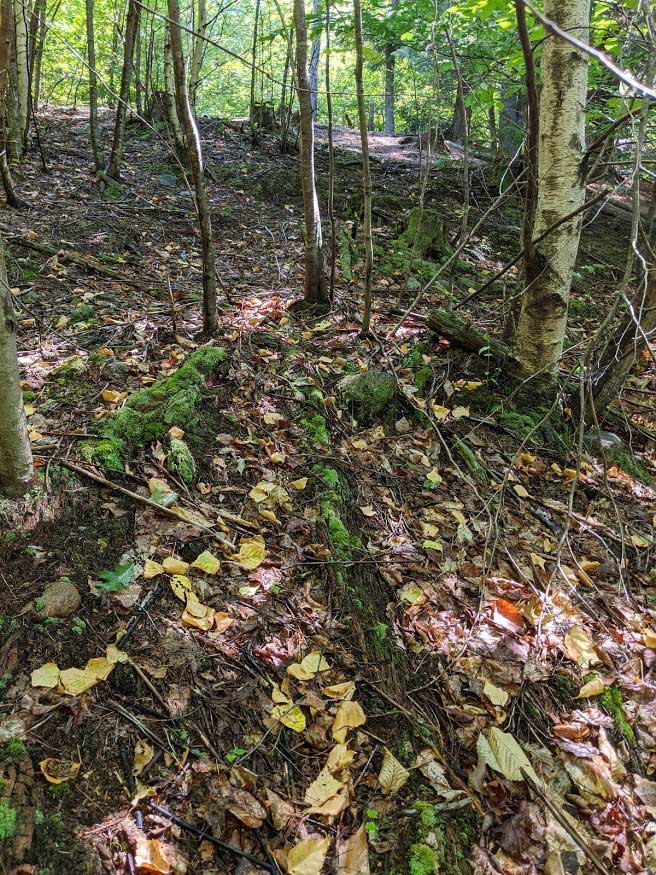Page 1 of 4
Today I learned a thing...
Posted: Sat Aug 22, 2020 5:26 pm
by Elleth
... Had a rare chance to get out this morning before lunch, and happened across a spot of moss on the earth.
No big deal, happens all the time. But this time it occured to me to think... why is this moss
here?
The first patch I cam across was at a transition between pinewoods and hardwood saplings - there was more light there. That was my first thought.
Then I noticed it. Something else was going on.
See it here?

- merf-forest-moss-01.jpg (168.14 KiB) Viewed 11899 times
.... this one's a little clearer -

- merf-forest-moss-02.jpg (176.37 KiB) Viewed 11899 times
Re: Today I learned a thing...
Posted: Sat Aug 22, 2020 5:32 pm
by Elleth
See how that moss is all in a line? Follow it up... and you'll eventually see something like this:

- merf-forest-moss-03.jpg (176.59 KiB) Viewed 11898 times
Aha!
This section of woods was logged a couple decades ago, so what I was seeing as "moss on the ground" is in fact "moss on the collapsed/half-buried remains of old fallen trees."
I'm sure it's not a universal sign, but it was still cool to find a little mystery tromping about the forest.
Amazing how you keep running across them, even after years of getting out.
You guys have any fun little detective stories?
Re: Today I learned a thing...
Posted: Sat Aug 22, 2020 7:38 pm
by Iodo
Cool find, I'll look out for that

Re: Today I learned a thing...
Posted: Mon Aug 24, 2020 12:50 am
by Greg
Moss and mushrooms in various forms both point to active rot...if you see mushrooms at the base of a tree or growing out of the side of a standing tree, don't set camp beneath and/or within striking distance of the tree, because it contains a rotting and/or hollow space which could compromise its structure in a wind or spontaneously.
Re: Today I learned a thing...
Posted: Mon Aug 24, 2020 2:36 am
by Will o’ the Wild
Have to admit, the first one made me think of a dead body. Like a fleeing, decapitated orc, with his hands above ... where his head used to be?
Re: Today I learned a thing...
Posted: Wed Aug 26, 2020 2:16 pm
by Greg
Will o’ the Wild wrote:Have to admit, the first one made me think of a dead body. Like a fleeing, decapitated orc, with his hands above ... where his head used to be?
HA!
Re: Today I learned a thing...
Posted: Sat Sep 19, 2020 8:41 pm
by Elleth
Today I learned ANOTHER thing.
As an aside - that's I think the secret to getting better in the woods. Always always be able to say at the end of even a short walk "here is a thing I did not know before, and now I do." Sometimes it'll be something small, even if you try you won't retain every little thing - but they DO add up. Eventually you look around and realize "oh.... I know what I'm looking at. I know what I'm doing. That's wild."

Here's some things I learned today -
- certain ID of silverberry
- the location of a crababble tree on our back property
- how to distinguish between ash and beech (I was looking for ash for a project, found only beech, oh well)
- an easier path to cross a particularly treacherous hill
- getting more used to my new bow. It *really* likes those old 3 Rivers arrows.
- after using a heavy cow leather belt pouch, I went back to a lighter weight goatskin one: realized I quite liked it. Because it was so soft, it flexed more as I fished for things in it, so it felt "bigger" than it actually was. Tradeoffs though: it's less secure I think.
- that plantain has an aftertaste vaguely like coconut. I'd always kinda pitied pre-New World people for all the tastes we take for granted they never knew. The more I dig into heirloom gardening and foraging, the more I appreciate just how much that goes both ways. There's *tons* of tasty tasty things just a bit off the path of a standard industrial diet.
Re: Today I learned a thing...
Posted: Sun Sep 20, 2020 7:23 am
by Iodo
Elleth wrote:
- after using a heavy cow leather belt pouch, I went back to a lighter weight goatskin one: realized I quite liked it. Because it was so soft, it flexed more as I fished for things in it, so it felt "bigger" than it actually was. Tradeoffs though: it's less secure I think
I've started to realize this, recently I made a softer leather belt pouch and it seems to work better
Re: Today I learned a thing...
Posted: Sun Sep 20, 2020 9:41 pm
by Manveruon
Iodo wrote:Elleth wrote:
- after using a heavy cow leather belt pouch, I went back to a lighter weight goatskin one: realized I quite liked it. Because it was so soft, it flexed more as I fished for things in it, so it felt "bigger" than it actually was. Tradeoffs though: it's less secure I think
I've started to realize this, recently I made a softer leather belt pouch and it seems to work better
I’ve been mulling this idea over a lot lately and even though I don’t have a ton of practical experience to back it up, I keep thinking to myself that kit items like pouches and waterskins, etc. just plain look *better* when they’re made from softer leather. Somehow it FEELS more practical in my mind, and when I look at someone’s kit with a bunch of heavy, stiff, brightly colored cow-hide items vs someone with more soft, pliable, darkly and richly patinaed leather (often goatskin and so forth), the one with the heavy stiff bright stuff just looks comparatively... fake? I guess? With a few exceptions, like knife sheaths, quivers, etc. (although I may yet change my tune about the quivers...)
Re: Today I learned a thing...
Posted: Wed Sep 23, 2020 4:18 am
by Cimrandir
I wonder what animal species were most commonly used for leather in the early medieval period. I'm not entirely sure on my cattle domestication history but I don't believe they were wide-spread at that point. Aurochs were already dying out after Rome which makes me think that goat and sheep would have been the mostly plentiful and easy to acquire.
Re: Today I learned a thing...
Posted: Wed Sep 23, 2020 7:55 am
by Eofor
Cimrandir wrote:I wonder what animal species were most commonly used for leather in the early medieval period. I'm not entirely sure on my cattle domestication history but I don't believe they were wide-spread at that point. Aurochs were already dying out after Rome which makes me think that goat and sheep would have been the mostly plentiful and easy to acquire.
From an early middle ages position Cow, goat, sheep and deer leather can all be attested in finds and in fact cattle were considered prime currency in Anglo Saxon England.
The fine for cattle rustling was equivalent to the weregild for killing a man so we know they were important beasts and there are also various laws dictating how and where cattle could be sold and butchered to prevent theft. Another record from Wales lists the fine for breaking the silence in court during the period as payable in up to three head of cattle, fines that continued to through the Norman period.
Some of the same law codes mention other types of leather such as the Laws of Athelstan one of which states, “That no shieldwright cover a shield with sheep's skin; and if he so do, let him pay thirty shillingsâ€
Presumably this is because while lovely and soft and supple sheep leather makes for a lousy protective barrier. On the other side of things we have the Loch Glashan (bible) bag which was made from a beautiful soft acorn tanned deerskin.
So they probably had all types and were sensible enough to use them where they were best suited.
Re: Today I learned a thing...
Posted: Wed Sep 23, 2020 8:37 am
by Manveruon
Hah! That’s fantastic information!
The thing about sheepskin is particularly interesting, because I have found that to be extremely true myself! Sheepskin can be soft and beautiful and luxurious, but BOY it tears easily, and just straight-up isn’t nearly as durable as most other leathers I’ve worked with. I 100% would not want to have a shield covered in the stuff!

Re: Today I learned a thing...
Posted: Wed Sep 23, 2020 12:11 pm
by Cimrandir
As always, Eofor your knowledge of that time period is just - *chef’s kiss of perfection*. I briefly tried to look up the domestication history of cattle in Britain but it was mostly about fancy breeds in the 18th century.
Do you know what the typical tanning process would have been? You mention the Loch Glashan which was acorn tanned. I just agree with Manv that the modern tanned cow just doesn’t look right.
Re: Today I learned a thing...
Posted: Wed Sep 23, 2020 11:21 pm
by Peter Remling
You might try the Doomsday Book for information on livestock at around 1085-6. I gave a quick look and it should "plow teams" per locale, although whether a plow team is made up of oxen, horse or mule it didn't specify. It was a quick look at 1 or 2 locales.
Re: Today I learned a thing...
Posted: Fri Sep 25, 2020 11:02 am
by Eofor
Cimrandir wrote:As always, Eofor your knowledge of that time period is just - *chef’s kiss of perfection*. I briefly tried to look up the domestication history of cattle in Britain but it was mostly about fancy breeds in the 18th century.
Do you know what the typical tanning process would have been? You mention the Loch Glashan which was acorn tanned. I just agree with Manv that the modern tanned cow just doesn’t look right.
Thanks my friend, it's my field of interest and to be honest I'm amazed how relevant it is at times to the discussions on here.
The typical tanning process in the Anglo Saxon period was the same as you see in later times - Skins were soaked and then flensed, further soaked in urine or wood ash and then scraped free of fur before being washed and tossed into a pit/vat filled with a lovely combination of poo (dog and bird seem to work best) before finally being added to a tannin bath.
Oak bark seems to have been the predominant source of tannin use although other barks such as elm or willow were also used. I'm guessing the acorn tanning would have been a reasonably rare occurrence as they grow on oaks which provide bark which will do the same job. Acorns on the other hand can be used as food although their most common use was to fatten up the herds of pigs that were driven into the forest in Autumn.
Peter Remling wrote:You might try the Doomsday Book for information on livestock at around 1085-6. I gave a quick look and it should "plow teams" per locale, although whether a plow team is made up of oxen, horse or mule it didn't specify. It was a quick look at 1 or 2 locales.
There is surprisingly little evidence on the numbers but the most common thinking is that by the time of the doomsday book most plough teams would have consisted of four to eight oxen. This was due to an advancement in farming technology in the form of the mouldboard plough. The older plough (an Ard) was able to be managed by a pair of oxen but this newer bigger plow required a bigger team.